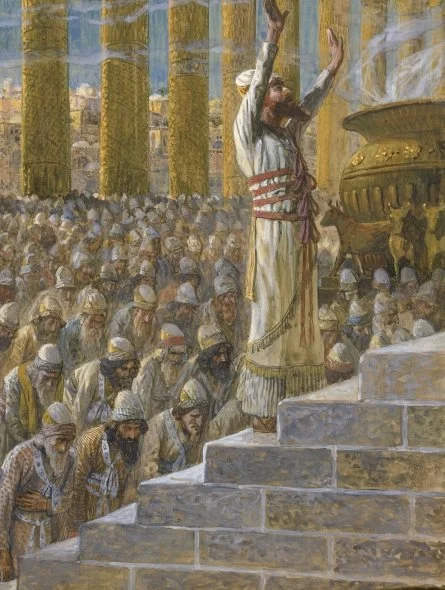Part 1: Ecclesiastes in the Fire – What Solomon Got Wrong
Bible Study | Ecclesiastes Wilderness Series
When discernment loses its anchor, wisdom becomes a weight.
Part 1: The Wisdom That Turned on Itself
The opening post in the Ecclesiastes Wilderness Series explores how Solomon’s divine gift of wisdom became a source of sorrow when disconnected from obedience. This study lays the foundation for understanding the slow drift from reverence to ruin.
INTRODUCTION
“Vanity of vanities,” he said. “All is vanity.”
And for generations, we believed him.
But what if that phrase—so often quoted, so often taught—was never meant to be taken as divine truth?
What if it was the confession of a man who strayed, not the declaration of a righteous prophet?
What if Ecclesiastes has been misrepresented, misinterpreted, and misused… and now Yahweh is calling His people to set it right?
This is the beginning of a holy correction.
Not to erase the words, but to put them in their proper place—under the fire of truth and the guidance of the Spirit of Yahweh.
Because Solomon was wise, but he didn’t stay wise.
And a divided heart cannot see clearly.
King Solomon with his wives.
| Illustrated in 1668 by Giovanni Battista Venanzi
Yahweh Is the Teacher. Not Solomon.
“But you, do not be called ‘Rabbi,’ for One is your Teacher, the Messiah, and you are all brothers.”
— Mattithyahu (Matthew) 23:8, TSR2009
Solomon began in wisdom.
But he ended with idolatry. He bowed to the gods of his wives, built altars to the abominations of the nations, and let his heart grow dull (1 Kings 11). So when he writes Ecclesiastes, we are not hearing the voice of a righteous king walking in favor.
We are hearing the voice of a man who once knew Yahweh… and walked away.
Ecclesiastes Is a Mirror, Not a Map
“Then I saw that wisdom is better than folly, as light is better than darkness. Yet the same event happens to all... Why then have I been so very wise?”
— Qoheleth (Ecclesiastes) 2:13–15 (paraphrased)
Solomon isn’t declaring truth here—he is confessing his disillusionment. Why? Because the same event doesn’t happen for all.
He is looking at life through the lens of a heart detached from obedience. He admits it:
“I searched how to cheer my body with wine… how to lay hold on folly.” (Eccl. 2:3)
“I gave my heart to know madness and folly.” (Eccl. 1:17)
This is not the Yahweh-anchored wisdom of Proverbs.
This is the wisdom of a man descending into darkness—and calling even wisdom “vanity.”
But is wisdom actually vanity?
No. Yahweh says otherwise.
“The fear of יהוה (Yahweh) is the beginning of wisdom, and the knowledge of the Set-apart One is understanding.”
— Mishlĕ (Proverbs) 9:10, TSR2009
Wisdom is a gift from Yahweh. It is pure, peaceable, full of good fruit (James 3:17). It is not vanity—but when used apart from Yahweh, it becomes corrupted.
Solomon Dedicates the Temple at Jerusalem
Painting by James Tissot | c. 1896–1902
Solomon’s Descent: From Wisdom to Sun Worship
The tragedy of Ecclesiastes is that Solomon begins to blur the lines between Yahweh and evil.
He says, “God gave this,” and “God allowed that,” but he doesn’t use Yahweh’s Name—he uses Elohim generically, like a man speaking of a distant deity, not a covenant King.
He begins to reflect what he worships:
A sun-worshiping culture
A theology of fatalism
A worldview of cycles, vanities, and meaningless repetition
He lost sight of the Son, and bowed to the sun.
This mirrors our generation—many have left SON worship for sun worship, blending Scripture with humanism, paganism, and psychology. They call themselves “Christian,” yet deny Yahweh’s power, His Name, and His truth.
Solomon was the beginning of this drift.
We are its end-time echo.
ROOTED IN THE WORD: What Ecclesiastes Is (and Isn’t)
It is a spiritual case study, not a divine conclusion.
It is the honest, heavy-hearted confession of a man in rebellion—not the decree of Yahweh.
It shows us what it looks like when we try to live without fear of Yahweh.
It ends with a trembling whisper of what Solomon should have shouted:
“Let us hear the conclusion of the entire matter: Fear Elohim and guard His commands, for this applies to all mankind!”
— Ecclesiastes 12:13 (TSR2009)
But even this is faint—because he never fully repents.
And we must not build doctrine on the words of a man mid-fall.
GRACE Method™ Reflection for Ecclesiastes in the Fire…
And Here We Find Grace…
GRACE perfectly encapsulates the transition from striving, to resting, in God's presence—which is at the heart of the message. Grace is the unmerited favor of God, and it's through His grace that we are able to move from struggle to peace. I invite you to pause and reflect on God's presence, how you can connect to God’s grace in a meaningful way.
Our GRACE Method™ is meant to encourage you so you can experience YHWH, Immanuel, and the Holy Spirit, in a deeper way, on a regular basis, through thought provoking Bible Study, Prayer, education, and Worship.
G – Grounded in Scripture
Read Ecclesiastes 2:13–15 and Proverbs 9:10.
In Ecclesiastes 2:13–15, Solomon observes that wisdom is better than folly, just as light is better than darkness. However, he also notes that both the wise and the foolish share the same fate—death—leading him to question the ultimate value of wisdom, declaring, "This too is meaningless." Bible Hub+4Bible Gateway+4BibleRef.com+4BibleRef.com+1Bible Gateway+1
Proverbs 9:10 offers a contrasting perspective: "The fear of the Lord is the beginning of wisdom, and knowledge of the Holy One is understanding."
R – Reflecting on Context
Solomon, once renowned for his wisdom, strayed from God's commandments by engaging in idolatry and marrying foreign wives who led him astray. His pursuit of meaning "under the sun" led to disillusionment and despair, as he realized that earthly wisdom and pleasures were ultimately futile.
A – Applying to Your Life
Reflect on your own life: Have you allowed cultural influences or personal confusion to distort your understanding of wisdom, life, or faith? Are you rooted in the truth of Yahweh, or have you, like Solomon, become disillusioned by worldly pursuits?
C – Communing with God
Pray to Yahweh for clarity and purification of your understanding. Invite His Spirit to teach you—not solely through human insight, but through His living Word and presence.
E – Exalting God
Praise Yahweh for being a God of eternal meaning, not vanity. Thank Yahushua, the Living Word, for bringing light to our darkness and guiding us toward true wisdom.PERSONAL DECLARATION
I will not follow the wisdom of the world.
I will not believe the lie that all is meaningless.
I will sit at the feet of Yahweh and let Him teach me truth.
Wisdom is not vanity—it is victory when rooted in the fear of Yahweh.
I declare that I belong to the Kingdom of light, and no confusion shall cloud my understanding.
In Yahushua’s Name, Amein.
SHARE YOUR FAITH
This message needs to be shouted from the wilderness.
Share this post with someone who’s been confused by Ecclesiastes or discouraged by what they’ve been taught.
Let them know—truth is rising, and Yahweh is the Teacher now.
Fuel the Mission – Just like a warm cup of coffee fuels the body, your support fuels our mission to share God’s Word with the world. Every contribution helps cover the costs of running this ministry—keeping Bible study resources, articles, and printables free for everyone, regardless of income or resources. Your generosity allows us to continue creating faith-filled content, ensuring that no one is hindered from deepening their walk with Christ. If you’ve been blessed by what you’ve found here, consider helping us fuel the mission so we can keep spreading His truth far and wide.


